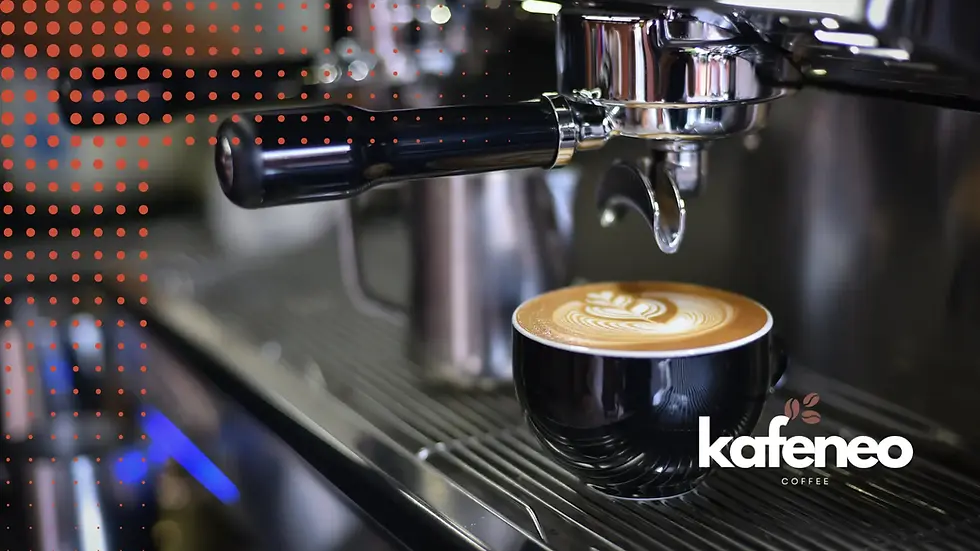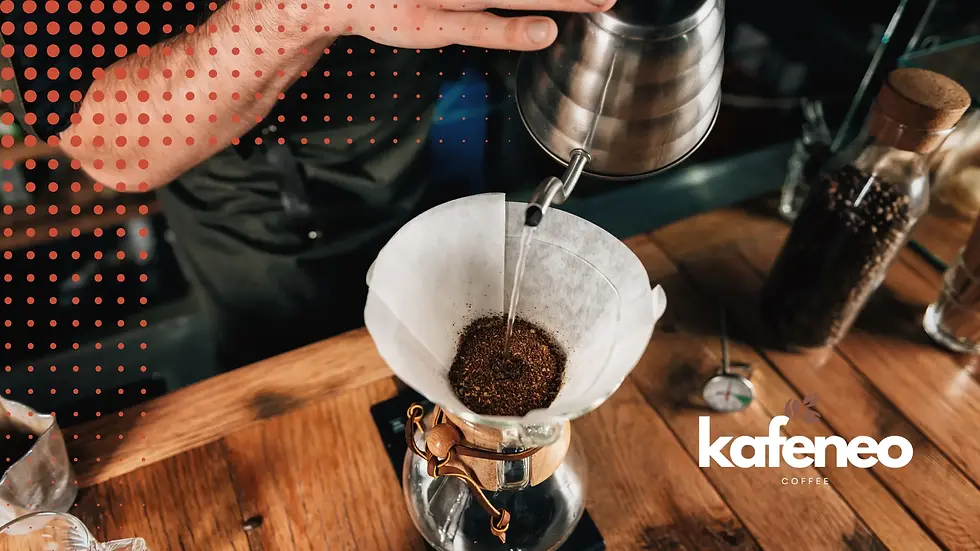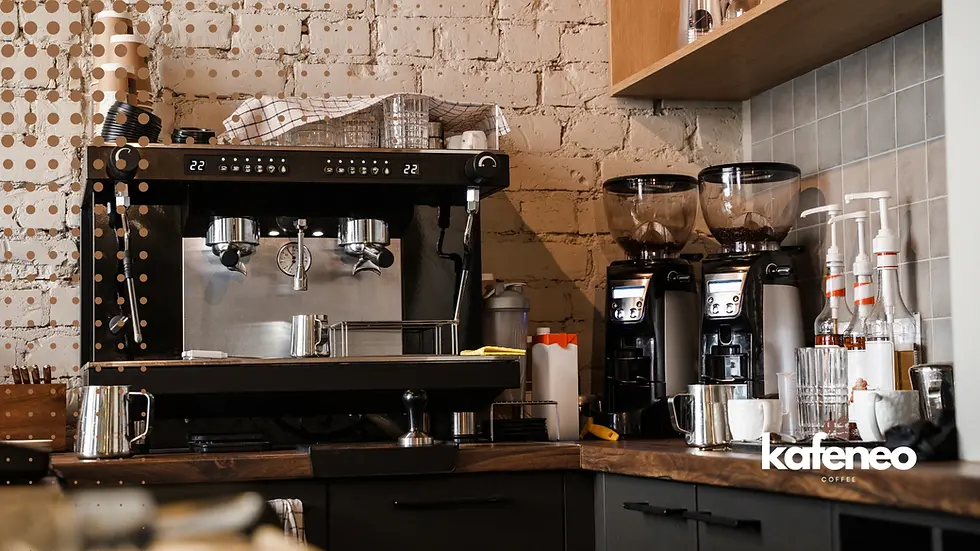Commercial Coffee Shop Equipment List: Essentials for Your Café Startup
- Kafeneo Coffee

- Aug 8
- 8 min read
Updated: Aug 9
A detailed commercial coffee shop equipment list covering must-have machines, barista tools, sourcing tips in South Africa, and budgeting advice for new café owners.
About the author: Kafeneo Coffee is a team of coffee experts passionate about helping entrepreneurs succeed in the coffee shop business. We share proven strategies on choosing prime locations, mastering brewing techniques, and running efficient operations. Our goal is to support South Africa’s growing coffee culture with trusted advice and insights.

Key Takeaways:
Essential commercial coffee shop equipment impacts quality and efficiency.
Choose espresso machines based on café size and volume needs.
Invest in quality barista tools for consistent drink preparation.
Source equipment locally in South Africa for better support and service.
Plan your budget carefully with a checklist for new café startups.
Opening a café takes more than great coffee and enthusiasm. Success starts with having the right equipment: chosen carefully, purchased in the right order, and matched to your budget.
This commercial coffee shop equipment list outlines exactly what you need, why each item matters, how much to budget, and where to source reliable gear in South Africa and beyond.
The aim is clear: deliver consistent drinks, keep service fast, and protect your profit margins from day one. This guide also serves as an essential café equipment checklist for new business owners, helping you track must-have gear from day one.
LOOKING TO INVEST IN A TRUSTED COFFEE FRANCHISE? Kafeneo offers a proven business model, premium coffee, and full support to help you succeed. Contact us today for franchise opportunities, pricing, and next steps.
Why Choosing the Right Café Equipment is Critical for Your Business

The equipment you choose directly affects drink quality, service speed, and operating costs. Spend where it counts, especially on brewing gear that impacts flavor and reliability.
Follow two key rules:
Match machine capacity to your expected daily volume.
Invest in commercial-grade coffee gear for critical tasks. These machines maintain stable temperatures, deliver consistent extractions, and last longer with fewer breakdowns.
Cutting corners on the wrong items leads to uneven drinks, frustrated customers, and costly repairs. Choosing well means smooth service, predictable maintenance, and a stronger return on every rand spent. Learn more about how to start a coffee shop in South Africa.
Essential Beverage Equipment for Coffee Shops

This equipment forms the core of your café’s operation and has the biggest impact on your product quality and service speed. Focus your budget and training here first to ensure every cup meets customer expectations and your workflow stays efficient.
Choosing the right machines and understanding their capacity needs will save headaches and help scale smoothly as demand grows.
Espresso Machines (Group Heads, Capacity)
Why it matters: Espresso machines determine shot consistency and steam speed for milk drinks.
Capacity rules: single-group for micro setups, two-group for typical small cafés, three-group for high volume.
What to look for: stable boiler, programmable dosing, easy service access.
Brands to consider: La Marzocco, Nuova Simonelli, Rancilio, Wega.
This section highlights some of the best espresso machines for small café startups that balance price, performance, and serviceability.
Commercial Grinders (Burr vs Conical, Doser Options)
Grind consistency is nonnegotiable.
Flat burrs give uniform particle size and speed.
Conical burrs run cooler and quieter.
Doserless grinders give fresher shots. Doser models help speed service during peak times.
Best practice: use one grinder for espresso and one for batch/decaf if budget allows.
Drip Coffee Makers & Batch Brewers
For black coffee sales, choose a brewer designed for volume.
Look for programmable, insulated thermal servers to protect flavour.
Bunn, Fetco, and Curtis are industry standards for large-batch brewing.
Additional Drink-Making Equipment for Café Menus
Wider menus require extra gear and create new revenue opportunities:
Hot water dispenser: provides consistent water temperature for tea and Americanos.
Blenders: high-speed units ideal for frappes and smoothies.
Cold-brew systems: batch-style setups for overnight extraction.
Pour-over station: attracts specialty coffee customers and allows premium pricing.
Syrup pumps, steam pitchers, and shot timers: small tools that improve speed and drink consistency.
Expanding your menu is often more affordable than it seems. Adding one or two specialty drinks each week lets you grow steadily without a full overhaul.
Back-of-House Café Equipment for Storage and Food Prep
A clean and practical back-of-house setup ensures smooth service and compliance with safety standards. Key equipment includes:
• Refrigeration: undercounter fridges, display fridges, and chest or upright freezers.
• Prep ovens and toasters: for warming pastries and paninis.
• Dishwasher: lowers labour demands and keeps cups sanitary.
• Shelving and storage: modular metal shelving to organize dry goods and supplies.
• Work tables and sinks: stainless steel surfaces for hygiene and durability.
Use café storage solutions that speed up restocking. Clearly label shelves and maintain a first-in, first-out inventory system to keep supplies fresh and organized.
Water Filtration and Maintenance Equipment for Coffee Shops

Water quality plays a major role in both the flavour of your drinks and the lifespan of your coffee machines. Invest in a reliable commercial-grade water filtration system, and if your local water supply is hard, pair it with a softening unit to protect against mineral buildup.
Key benefits include: cleaner, more consistent flavour, reduced scale buildup inside boilers, and fewer costly service calls.
Ongoing care: schedule regular descaling, perform daily backflushing on espresso machines, and keep cleaning kits, spare seals, and essential maintenance tools on-site so you can act quickly if issues arise.
Strong water filtration is one of the smartest, highest-ROI investments you can make for long-term café performance and equipment reliability.
Barista Tools and Small Equipment Every Café Needs

Smallwares play a crucial role in ensuring both consistency and speed behind the bar. Having the right complete barista tools and accessories for coffee shops can significantly improve the quality of each cup and streamline daily operations.
Below is a comprehensive list of essential items every coffee shop should have on hand:
Tampers and distribution tools for even espresso puck compression
Digital scales to ensure precise dosing of coffee grounds
Milk pitchers in multiple sizes to accommodate different drink volumes
Thermometers and shot timers for accurate milk steaming and extraction
Knock boxes and portafilter brushes for quick waste disposal and cleaning
Shot glasses and tamp-mats to assist with shot measurement and workspace organization
Cleaning brushes and backflush detergent to maintain machine hygiene and performance
Regularly training your baristas to properly use and care for these tools every shift is vital. Even small inconsistencies in tamp pressure or milk temperature can cause noticeable differences in taste and drink quality.
Point-of-Sale and Technology Systems for Café Operations

Integrating the right technology into your café operations minimizes friction, reduces errors, and streamlines daily workflows.
POS systems: Choose a system that offers robust inventory management and detailed sales reporting. Cloud-based platforms like Lightspeed or Square are ideal for most startups because they’re scalable, user-friendly, and allow remote monitoring.
Order management: Utilize tablets or kitchen display screens to improve communication between front-of-house and baristas, speeding up service and reducing mistakes.
Payments: Offering multiple payment options, including contactless, card, and mobile wallets, is essential to meet customer expectations and speed checkout.
Security: Installing basic CCTV cameras and alarm systems provides necessary protection for your staff, inventory, and premises, giving you peace of mind.
Mobile and curb side service: Use simple, efficient packaging and designate a specific pickup area to handle takeout and curb side orders, boosting throughput during busy times.
Regularly review your POS data at least weekly to identify inventory waste, track best-selling items, and adjust stock and staffing accordingly to maximize profitability.
Optional Coffee Shop Equipment to Enhance Your Concept
Consider adding these optional pieces only after your core equipment and operations are well-established and running smoothly.
Small roaster: Ideal for vertical integration, this allows you to control your coffee’s flavor profile and create a unique brand identity.
Merchandise shelving: Use dedicated shelving to display and sell packaged beans, branded mugs, and other merchandise, creating an additional revenue stream.
Specialty display cases: Showcase pastries, snacks, and grab-and-go items in attractive cases that encourage impulse purchases and improve customer experience.
Green espresso machines: Invest in energy-efficient machines that reduce your utility costs and support sustainable business practices.
Before investing heavily in optional equipment, ensure you have a clear revenue strategy and test customer demand to avoid unnecessary expenses.
Where to Buy Commercial Coffee Shop Equipment in South Africa
If you’re wondering where to buy commercial coffee machines in South Africa, it’s best to start with local suppliers who offer not only quality products but also reliable service and hands-on training. Establishing a relationship with local vendors ensures faster support, easier maintenance, and access to expert advice tailored to your region’s needs.
Here are some recommended South African suppliers to consider:
Equipment Café: Specializes in a wide range of specialty coffee gear and high-quality grinders suited for startups and established cafés alike.
Coffee Unplugged: Offers machine rentals, sales, and comprehensive service coverage across major cities, making it convenient for growing businesses.
Cape Coffee Beans: Provides retail and commercial espresso machines, grinders, and transparent pricing to help you make informed decisions.
For a broader selection of equipment or if you’re considering export models, it’s wise to research major international suppliers. They provide detailed product specifications and allow you to compare different brands and models before committing to a local purchase.
Café Equipment Budget Guide and Buying Strategy
Plan your spend with a two-step approach: essentials first, upgrades later.
Typical price ranges (South Africa approximate):
Espresso machine: R40,000 to R120,000 depending on group count and brand.
Commercial grinders: R8,000 to R30,000 each.
Brewers and batch equipment: R6,000 to R20,000.
Refrigeration: R10,000 to R50,000.
POS and smallware’s: R5,000 to R20,000.
Strategy:
Buy durable equipment where it affects taste or uptime.
Lease or buy used for lower-impact items to reduce initial capex.
Keep a maintenance fund equal to 5 to 10 percent of equipment spend annually.
Negotiate warranties and local service agreements with suppliers.
Use a simple startup café equipment checklist for new business owners to track purchases, warranties, and service dates.
Final Thoughts
Use this commercial coffee shop equipment list as your blueprint. Start with the essentials, protect your core brewing gear, and buy locally where service and training matter.
Keep a realistic budget, track maintenance, and prioritize menu items that fit your equipment and staff capacity. Invest in training and smallware’s. They multiply the value of any machine.
If you’re ready to make your dream real, now’s the time to get brewing. Contact us today to learn more about our franchise store oppertunities.
Frequently Asked Questions
What certifications or permits are needed for café equipment installation?
Many regions require health and safety certifications for commercial kitchen equipment installation. You may need electrical, plumbing, and fire safety inspections before opening. Complying with local food service regulations ensures your equipment meets sanitation standards. Additionally, professional installation by certified technicians is often mandatory for warranties and insurance purposes. Always check with your local municipality or health department to confirm specific requirements before purchasing or installing café equipment.
How often should commercial coffee equipment be professionally serviced?
Regular professional servicing is crucial for optimal performance. Most commercial espresso machines and grinders require at least bi-annual servicing to prevent breakdowns and maintain brew quality. Some high-usage cafés schedule quarterly maintenance. Regular servicing includes descaling, parts replacement, and calibration. Following the manufacturer’s recommended maintenance schedule not only extends equipment lifespan but also ensures consistent beverage quality and reduces the risk of costly emergency repairs.
What are the energy consumption considerations for commercial coffee equipment?
Commercial coffee equipment can be significant energy users, especially espresso machines and refrigeration. Opting for energy-efficient models reduces utility costs and environmental impact. Look for machines with energy-saving modes, programmable shutoffs, and efficient boilers. Properly maintained equipment operates more efficiently. Consider investing in LED lighting for displays and using insulated thermal carafes to reduce electric hot plate use. Factoring energy consumption into your buying decision helps lower long-term operational costs.
Can I lease commercial coffee equipment instead of buying? What are the pros and cons?
Leasing equipment can lower upfront costs and provide access to higher-end gear with manageable payments. It often includes maintenance packages, reducing repair expenses. However, leasing may cost more over time and limit ownership flexibility. Early contract termination fees can apply, and upgrades may require new agreements. Leasing suits startups with tight budgets or uncertain growth plans, while purchasing benefits long-term operators aiming to build equity in their equipment.
How do environmental factors like water hardness affect coffee machine performance?
Hard water contains minerals like calcium and magnesium that cause scale buildup inside boilers and pipes. This buildup reduces heating efficiency, damages components, and can alter coffee taste negatively. Using water filtration and softening systems mitigates these effects, prolonging equipment lifespan and maintaining consistent flavour. Regular descaling removes accumulated scale. Ignoring water quality issues leads to frequent breakdowns, higher maintenance costs, and inconsistent coffee quality, making water treatment essential for all cafés.


Comments